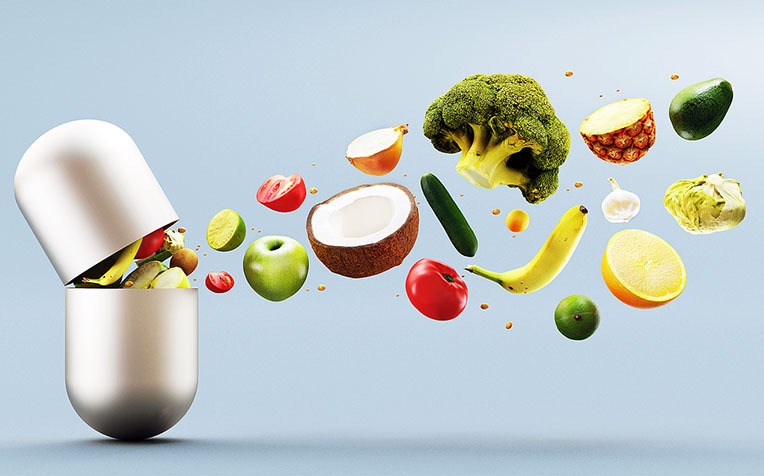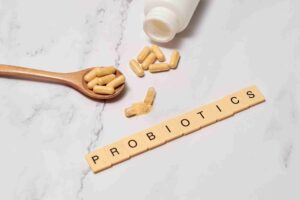
The Role of Probiotics and Prebiotics in Maintaining Gut Health
A healthy gut keeps every aspect of your immune system working properly. Data from the Karolinska Institutet and beyond tells us that we have more than 40 million microbial cells in the body. About 80% of those cells live in our gut. This forms the gut microbiome, which breaks down carbs and extracts food nutrients.
A healthy individual has a balanced microbiome. Both good and bad bacteria are working to break down food and support proper digestion. Sometimes, the microbiome gets disrupted, and our gut function suffers.
Probiotics and prebiotics help restore that balance. This article will teach you more about how the two improve microbial wellness. In time, this helps maintain proper gut health.
What Are Probiotics and How Do They Benefit the Gut?
Probiotics are live microorganisms, usually bacteria or yeast, which help the body break down food. When you consume them in an adequate amount, they are beneficial and gut-supportive, keeping the microbiome healthy.
They are found in various products, such as supplements and fermented foods. Probiotics restore balance in the microbiome and outcompete the harmful microbes.
They also produce short-chain fatty acids (SCFA) such as:
- Butyrate: Maintains gut lining integrity
- Acetate: Influences pH and gut motility
- Propionate: Regulates gut microbiota
According to studies at the Beijing University of Chinese Medicine by Yuhang Du, these three make up 95% of the SCFAs in the gut.
The most common strains are Lactobacillus and Bifidobacterium. These microorganisms occur naturally in the gut (i.e., your small intestine and colon) and help maintain digestive balance. These strains colonize the gut and protect against dysbiosis.
What Are Prebiotics and Why Are They Important?
Prebiotics are fermentable fibers or substrates that act as nourishment for the good bacteria (probiotics). These are non-digestible, which means that human enzymes can’t break them down.
Common prebiotics include:
- Inulin: Most common in chicory root, onions, garlic, etc.
- Fructooligosaccharides (FOS): Found in asparagus, bananas, artichokes, etc.
- Resistant starches: Present in beans, grains, potatoes, etc.
Prebiotics pass the stomach and reach the gut. Here, the fibers feed bacteria and support the gut microbiome. Oligosaccharides (inulin and FOS) are the most notable prebiotics. Resistant starches offer the same effect and support a healthy gut flora.
In our experience…
It is important to do very low doses initially of these prebiotic foods, as they can cause more bloating and digestive distress if done in larger amounts and too fast. Also, it may be best to include them later in gut treatment as patients have been able to tolerate them better.
How Do Probiotics and Prebiotics Work Together?
Probiotics and prebiotics work together through a process called “synbiotics.” They build on each other’s benefits, improving the gut colonization power. To put things simply, their synergistic effect creates the fuel needed to keep microbial resilience and diversity.
Probiotics colonize the gut and outcompete harmful bacteria, restoring damage. Prebiotics feed probiotics, supporting their activity and growth.
The combination is effective, reinforcing gut function. It helps increase the production of SCFAs, strengthening the gut lining and supporting immune functions.
What Are the Digestive and Immune Benefits of a Healthy Gut Microbiome?
A healthy gut microbiome breaks down food particles that the digestive system can’t break down alone. This includes non-digestible fibers, which produce SCFAs that keep the gut lining and colon healthy.
The bacteria produce vitamins such as B and K, which are important for overall health. They also synthesize fatty acids and amino acids, which contribute to nutrient absorption and metabolic function.
The gut microbiome also has an important role in immune modulation and inflammation control. The healthy microbes train the immune system to recognize the harmful pathogens and tolerate the harmless ones.
A well-regulated gut prevents the immune system from overreacting. This reduces the risks of chronic inflammation or autoimmune disorders in the long run.
A healthy gut also regulates the gut-brain axis, which supports good mental health. A balanced gut microbiome produces neurotransmitters such as serotonin and other molecules that influence the mood.
Studies on the connection between probiotics and serotonin at the Government College University Faisalabad, by Noor Aram and associates, prove this phenomenon. According to the 2023 study, probiotics increase serotonin levels in the gut, leading to higher gut motility and better mental health.
What Foods Are Naturally Rich in Probiotics and Prebiotics?

Foods such as yogurt, miso, bananas, and chicory are naturally rich in probiotics. These let you boost microbial diversity naturally, without relying on traditional treatments.
Probiotics are present in fermented foods. These are made by adding microorganisms such as yeast or bacteria to a food source. The live cultures colonize the gut and improve microbial balance.
Consider adding the following probiotics to your diet or a healthy digestive system:
- Yogurt (choose non dairy options if dairy intolerant)
- Kefir
- Miso
- Kombucha
- Kimchi
- Sauerkraut
Prebiotic fibers have compounds that the digestive system can’t fully break down. The fibers that “escape” feed the gut bacteria and synthesize nutrients for the body. Common prebiotic foods include:
- Garlic
- Onions
- Bananas
- Chicory
- Leeks
- Asparagus
- Oats
- Apples
Diet diversity improves the chances of building a healthy microbiome. Consider a plant-based, gut-friendly diet that includes polyphenols, legumes, whole grains, vegetables, and fruits.
The correct foods supply bacteria in the gut, so consume fermented foods and dietary fiber regularly. This sustains gut health in a natural way, as these fibers promote growth.
Can Supplements Be as Effective as Food-Based Sources?
Probiotics and prebiotics are as effective as food-based sources, perhaps even more because they generally are higher in probiotic strains. However, their effectiveness depends on the current gut health. Probiotic supplements can’t replace a nutrient-rich diet, but are useful in replenishing disrupted gut flora.
Probiotic and prebiotic foods offer a complete food matrix. This includes vitamins, fibers, enzymes, and polyphenols that improve microbial function naturally.
Supplements are more concentrated and targeted in comparison to food-based sources. A capsule can provide billions of good microorganisms, without requiring you to eat lots of food. A naturopath can choose the right supplements based on:
- CFU Count: One dose of supplements has between one and more than 50 billion colony-forming units (CFUs).
- Strain Selection: Supplements deliver strains such as Bifidobacterium longum or Lactobacillus rhamnosus, which offer relief from gastrointestinal issues.
- Survivability: Encapsulated probiotic supplements are more bioavailable because the capsules protect bacteria from being fermented by the stomach acids.
Prebiotic and probiotic whole foods can support the functions of a healthy gut system, but it’s not always enough.
According to studies at the Jodhpur Agriculture University led by Raju Lal Bhardwaj, food quality saw a 25% to 50% decline. That means that people have to resort to supplements to make up for the lost nutritional value.
Things such as antibiotics, chronic digestive issues, and food intolerances can disrupt the microbiota. Supplements help restore that balance faster than whole foods can.
How Do You Know If Probiotics Are Working?

You know that your probiotics are working if you see improvements in digestion, energy levels, and bowel movement. Stool has a better consistency after successful treatment, is more regular, and causes less discomfort. You’ll also notice less gas or bloating as probiotics improve motility.
It takes some time until the flora stabilizes its function in the gut. The majority of patients go through a phenomenon referred to as the Herxheimer reaction. This includes temporary symptoms like mild bloating, gas, and stool changes.
According to studies on 37 patients at multiple hospitals in China, two patients on probiotics also had diarrhea. This means a 5.41% chance of reaction, but this is generally rare.
Expect results in the following average timeframes:
- 3 to 7 days for digestive relief
- 1 to 2 weeks for a regular bowel movement
- 2 to 4 weeks for immune benefits
- 3 to 6 weeks for changes in the mood
Results depend on the person’s immune system, so keep in touch with your doctor.
What’s the Difference Between Probiotics and Prebiotics?
Probiotics and prebiotics are different because the former replenishes live beneficial microorganisms, whereas the latter feeds them. Here’s a breakdown of their mechanism and function:
Probiotics | Prebiotics |
Living beneficial organisms | Food for living beneficial organisms |
Digestible and sensitive to stomach acids | Non-digestible and pass the stomach acid |
Short-lived shelf-life | Longer shelf life |
Adds good microbes to the gut flora | Help existing microbes multiply in the gut |
Prebiotics and probiotics are complementary to weight loss efforts, but through different mechanisms. Studies at Università degli Studi di Perugia show that probiotics can lead to a 3.3% reduction in visceral fat in the belly.
On the other hand, prebiotics support blood sugar balance and improve satiety. This makes it easier to lose weight.
Are Synbiotics the Future of Gut Health?
Synbiotics are the future of microbiome therapy due to the combination of customized strains and designer fibers. The synbiotics optimize the flora, and the engineered strains improve the immune response.
Personalization makes it easy to offer targeted treatments for diverse conditions or microbiome balances. This leads to better symptom relief and more effective colonization. Smart delivery systems of the next-generation treatments support better bacterial survival and increased effectiveness.
Emerging studies led by Xiuyu Fang in 2025 show that precision probiotics can address a series of conditions. This includes obesity, IBS, autoimmune disease, and other conditions that cause microbiota disruptions. This is possible because targeted treatment is customized based on individual microbiota composition.
- Post Title : The Role of Probiotics and Prebiotics in Maintaining Gut Health
- Author: Dr. Sparks, N.D
- Clinically reviewed by - Dr. Susan Cucchiara, N.D.
- Date Published :


